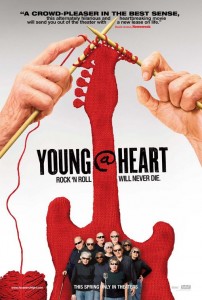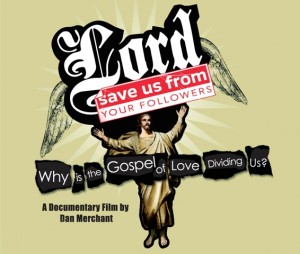By Mark
Special to the Dagger
Note on the ratings:
The rating system is based on four points, or stars if you prefer. The overall rating is subdivided into four categories, acting, character, structure, and writing. Each of these categories receives a four point rating and in most cases the average will be the overall rating for the movie. Ratings will tend to skew upwards as, well, I like the movies. Otherwise I wouldn’t waste time reviewing them.
WE LIVE IN PUBLIC (2009)
Director: Ondi Timoner
“Lions and tigers used to be kings of the jungle and then one day they wound up in zoos – I suspect we’re on the same track.” – Josh Harris
Meet Josh Harris. He is the most influential person in internet technology you have never met. One of the original dot-com millionaires, Josh created the precursors to social media on the internet that are more popular today with increased bandwidth including streaming video and live chat. As the film will tell you, Josh was always ahead of the curve. So much in fact, that he has almost single-handedly predicted each major internet revolution. His original product, social and video networking simultaneously, is now the norm for internet communication. How is it you have never heard of this pioneer? As it turns out, that question is as difficult to answer as it is to define Josh.
Where the film becomes explicit and interesting is when it turns to a character study of Josh and his quirks. A portrait of an artist and a mad genius, Josh’s relationships to family, friends, and loved ones all swirl at the center of the film. Amongst the backdrop of Josh’s experiments with society, including a 24/7 surveillance bunker housing the artist population of NYC and a similar viewing of Josh and his girlfriend during their mundane life, lays the dormant giant of his ego and detachment from personal relationships including his parents and siblings. Bounding between Josh’s failed personnel life and his teetering professional life, the film navigates a capricious man in an eccentric world most of which Josh created for himself.
While the premise of Josh’s genius and predilection to predict the future of the internet is questionable at best (is he the only person that would have imagined an internet television network?), the film certainly draws you in with the inevitable crash and burn you see from the first frames. Almost spinning out of control at times, Ondi does a good job of reigning in the subject he is trying to capture while giving a complete picture of a man falling from the edge of the world. If nothing else, this film and Josh do a superb job in turning our love of celebrity on its head. Is it worth seeing a man fail when you can see inside the man?
Acting 2.0
Character 3.0
Structure 3.0
Writing 3.5
OVERALL 3.0
YOUNG @ HEART (2007)
Director: Stephen Walker and Sally George
Ah, the feel good documentary. Who doesn’t love old people performing modern rock songs in all their geriatric splendor? The film delves into the rehearsal for an upcoming concert being performed by a cast of 70+ year-old seniors. Their maestro, Bob Cilman, stretches them for all they are worth to perform several difficult modern songs. Early in the film, the point is made that these performers are more comfortable in the classic or operetta arena, but retain a sense of open mindfulness that many of us far their junior would do well to heed. As we are introduced to various members of the ensemble, we are introduced into snippets of their lives, hopes, and dreams.
As on would expect, death is peppered throughout the film. Several members of the group do not survive until show time and while the grief is present, it takes on a different meaning amongst this age group. There are few tears, but always a persistent resilience to move on and perform. The most moving scene in the film involves a solo performance of Coldplay’s Fix You, originally intended to be performed as a duet by two former members that both stopped participating prior to this show for health reasons.
The film delivers exactly what is expected: a sampling of these elderly people’s lives set to music. The music video segments alone are extremely well done and pop from the screen with the enjoyment and enthusiasm of the performers. Where it falls flat is in the lack of depth that is delivered. The only moments in the film that delves deeper than a cursory examination are the aforementioned solo performance and a performance at a local prison immediately following the passing of a member. While the prison scene is a beat in the heart of the film, the performance of Fix You is what sets the film apart. The shadow of death that lurks in the background of the film builds until that moment and it alone is the heart of the film and lingers on well past the credits.
Acting 3.0
Character 3.0
Structure 2.5
Writing 2.0
OVERALL 2.75
LORD, SAVE US FROM YOUR FOLLOWERS (2008)
Director: Dan Merchant
On the simplest premise Dan Merchant marches out into the world to discover why our religion is driving us apart as a society. Placing him self at the center of the controversy, Dan does nothing to hide his own faith, while at the same time doing what many of us fail to do in any conversation; listen.
Starting with an extremely brief history of religion in America, the film turns immediately back to its premise to discuss the role of politicized religion. Included are interviews with various religious leaders of various Christian faiths, politicians, and average American’s. Specific instances of intolerance are discussed briefly, but the film takes a hard left to discuss the issue of homosexuality and religion. Examination of a protest march held by a youth group and the counter protest by gay activist filters in and out of the discussion until the culmination of the film. Sticking to his premise, Dan gives a voice to both sides of the argument with a minimum of mediation.
Perhaps not a film for everyone, Dan attempts to provide a protest of his own against our increasingly polarized religious views. While it certainly falls into a left of center ideology, it doesn’t go as far to the left as a Michael Moore film, nor does it explicitly block opposition voices. The premise stands strong in that we as people should not place judgment on others. In fact, in a quite touching scene, Dan goes as far as to set up a confessional at a gay pride rally to confess the sins of intolerance and apologize for the church’s stance on homosexuality. Perhaps the point of the film is the point of life; listen to others and love them for who they are without judgment.
Acting 3.5
Character 3.0
Structure 3.0
Writing 3.5
OVERALL 3.25






Leave a Reply
You must be logged in to post a comment.